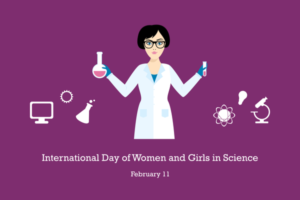Women Scientists at the forefront of the fight against COVID-19.
 The outbreak of the COVID-19 pandemic has clearly demonstrated the critical role of women researchers in different stages of the fight against COVID-19, from advancing the knowledge on the virus, to developing techniques for testing, and finally to creating the vaccine against the virus.
The outbreak of the COVID-19 pandemic has clearly demonstrated the critical role of women researchers in different stages of the fight against COVID-19, from advancing the knowledge on the virus, to developing techniques for testing, and finally to creating the vaccine against the virus.
At the same time, the COVID-19 pandemic also had a significant negative impact on women scientists, particularly affecting those at the early stages of their career, and thus contributing to widening the existing gender gap in science, and revealing the gender disparities in the scientific system, which need to be addressed by new policies, initiatives and mechanisms to support women and girls in science.
Against this backdrop, this year’s celebration of the Day will address the theme “ Women Scientists at the forefront of the fight against COVID-19 ” and will gather together experts working in fields related to the pandemic from different parts of the world.
The 2021 main event will take place online . A simultaneous interpretation of the debates will be provided in English and French.
On 11 February 2021, the 6th International Day of Women and Girls in Science
Assembly will be held at the United Nations Headquarters virtually. With great
momentum and interest to accelerate progress in achieving the 2030 Development
Agenda and its 17 Global Goals, the 6th International Day of Women and Girls in
Science Assembly theme will be Beyond the Borders: Equality in Science for Society,
with a special focus on the value of the social aspects and cultural dimensions in Science, Technology and Innovation to enhance sustainable development programmes.
Science and gender equality are both vital for the achievement of the internationally
agreed development goals, including the 2030 Agenda for Sustainable Development .
Over the past 15 years, the global community has made a lot of effort in inspiring and
engaging women and girls in science. Yet women and girls continue to be excluded from participating fully in science.
At present, less than 30 per cent of researchers worldwide are women. According
to UNESCO data (2014 – 2016), only around 30 per cent of all female students select
STEM-related fields in higher education. Globally, female students’ enrolment is
particularly low in ICT (3 per cent), natural science, mathematics and statistics (5 per
cent) and in engineering, manufacturing and construction (8 per cent).
Long-standing biases and gender stereotypes are steering girls and women away from
science related fields. As in the real world, the world on screen reflects similar
biases—the 2015 Gender Bias Without Borders study by the Geena Davis Institute showed that of the onscreen characters with an identifiable STEM job, only 12 per cent
were women.
In order to achieve full and equal access to and participation in science for women and
girls, and further achieve gender equality and the empowerment of women and girls, the United Nations General Assembly adopted resolution A/RES/70/212 declaring 11
February as the International Day of Women and Girls in Science .















